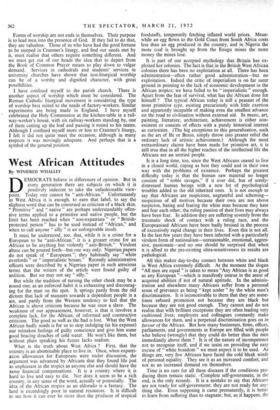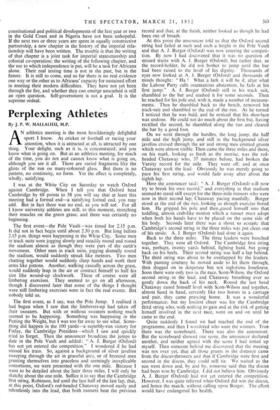West African Attitudes
By WINIFRED WHALLEY
DEMOCRATS believe in differences of opinion. But in every generation there are subjects on- which it is positively indecent to take the unfashionable view- point. Today one cannot be " anti-African." Unfortunately in West Africa it is enough, to earn that label, to say the slightest word that can be construed as criticism of a black skin. " Primitive " and " native " are perhaps understandably offen- sive terms applied to a primitive and native people, but the limit has been reached when " non-expatriate " or " British- protected person " has to be used instead of "African," and when to call anyone " silly " is an unforgivable insult.
It must be understood, too, that, while it is a crime for a European to be "anti-African," it is a greater crime for an African to be anything but violently " anti-British." Virulent abuse can be poured forth—but one way only. Nigerian. papers do not speak of " Europeans "; they habitually say " white overlords " or " imperialistic bosses." Recently administrative officers were described by a Nigerian paper in such atrocious terms that the writers of the article were found guilty of sedition. But we may not say " silly."
But while the tradition of turning the other cheek may be a sound one, as an enforced habit it is exhausting and discourag- ing for the man on the spot. It springs partly from the old dictum that lack of manners towards a dependent people is a sin, and partly from the Western tendency to feel that the , African is above criticism because he was once a slave. The weakness of our appeasement, however, is that it involves a complete lack, for the African, of informed and constructive criticism. The good as well as the bad is lost. What the West African badly needs is for us to stop indulging (at his expense) our mistaken feelings of guilty conscience and give him some good bracing douches of cold water. He won't like them, but without plain speaking his future lacks realism.
What is the truth about West Africa ? First, that the country is an abominable place to live in. Once, when expatri- ation allowances for Europeans were under discussion, the argument was advanced by Africans that they found life just as unpleasant in the tropics as anyone else and should have the same financial compensations. It is a country where it is hard to live and easy to die. Nor does it seem to be a rich country, in any sense of the word, actually or potentially. The idea of the African tropics as an eldorado is a fantasy. The land is exceedingly poor in natural resources. It is difficult to see how it can ever be more than the producer of tropical foodstuffs, temporarily fetching inflated world prices. Mean- while an egg flown to the Gold Coast from South Africa costs less than an egg produced in the country, and in Nigeria the more coal is brought up from the Enugu mines the more money the mines lose.
It is part of our accepted mythology that Britain has ex- ploited her colonies. The fact is that in the British West African colonies there has been no exploitation at all. There has been administration—often rather good administration—but no exploitation. Indeed the critic of imperialism is on far surer ground in pointing to the lack of economic development in the African tropics; we have failed to be " imperialistic " enough. Apart from the feat of survival, what has the African done for himself ? The typical African today is still a peasant of the most primitive type, existing precariously with little exertion and apparently incapable of making even the smallest advance on the road to civilisation without external aid. In music, art, painting, literature, architecture, achievement is either non- existent or consists of effects with a purely historical interest as curiosities. (The big exceptions to this generalisation, such as the art of Ife or Benin, simply throw into greater relief the ordinary lack of artistic achievement.) Although the most extraordinary claims have been made for primitive art, it is still true that in all the higher reaches of the intellectual life the Africans are an untried people.
It is a long time, too, since the West Africans ceased to live in a closed world, coping as best they could and in their own way with the problems of existence. Perhaps the greatest difficulty today is that the human raw material no longer consists of " noble savages," if it ever did, but of sorely- distressed human beings with a new lot of psychological troubles added to the old inherited ones. It is not enough to say that Africans are suspicious, ungrateful and scheming— suspicious of all motives because their own are not above suspicion, hating and fearing the white man because they hate and fear each other; the ruling passion of their lives may always have been fear. In addition they are suffering severely from the traumatic shock of contact with a ruling race, and the Europeanised Africans have been badly bruised in-the process of excessively rapid change in their lives. Even this is not all. In the last few years they have been infected with a particularly virulent form of nationalism—unreasonable, emotional, aggres- sive, passionate—and no one should be surprised that when it is allied to the pre-existing ultra-sensitiveness its results are pathological.
All this makes day-to-day contact between white and black in West Africa extremely difficult. At the moment the slogan "All men are equal " is taken to mean "Any- African is as good as any European "—which is manifestly untrue in the sense of acquired abilities if not of natural aptitude. In the adminis- tration and elsewhere many Africans suffer from a personal sense of grievance as being kept under " by the white man's discrimination. It is inconceivable to them that they are some- times refused promotion not because they are black but because they are not good enough. They cannot and do not realise that with brilliant exceptions they are often leading very cushioned lives; employers and colleagues constantly make allowances foi them, and a perpetual discrimination goes on in favour of the African. But how many businesses, firms, offices, parliaments, and governments in Europe are filled with people who believe (wrongly) that they could do better than the men immediately above them ? It is of the nature of incompetence not to recognise itself, and if we insist. on providing the easy excuse of " white bossdom " we must expect it to be used. As things are, very few Africans have faced the cold bleak winds of personal equality. They see it as an increased comfort, and not as an increased demand on themselves.
Time is no cure for all these diseases if the conditions pro- ducing them remain static. Complete self-government, in the end, is the only remedy. It is a mistake to say that Africans are not ready for self-government; they are not ready for any- thing else. Even supposing it came prematurely, it is better to learn from suffering than to stagnate; but, as it happens, the constitutional and political developments of the last year or two in the Gold Coast and in Nigeria have not been unhopeful. If the next two or three years are spent in equally constructive partnership, a new chapter in the history of the imperial rela- tionship will have been written. The trouble is that the writing of that chapter is a joint task for imperial statesmanship and colonial co-operation; the writing of the following chapter, and the use to which independence is put, will be a task for Africans alone. Their real testing time is not in the past, but in the future. It is still to come, and so far there is no real evidence one way or the other as to Africans' capacity for sustained effort in meeting their modern difficulties. They have not yet been through the fire, and whether they can emerge unscathed is still an open question. Self-government is not a goal. It is the supreme ordeal.



































 Previous page
Previous page